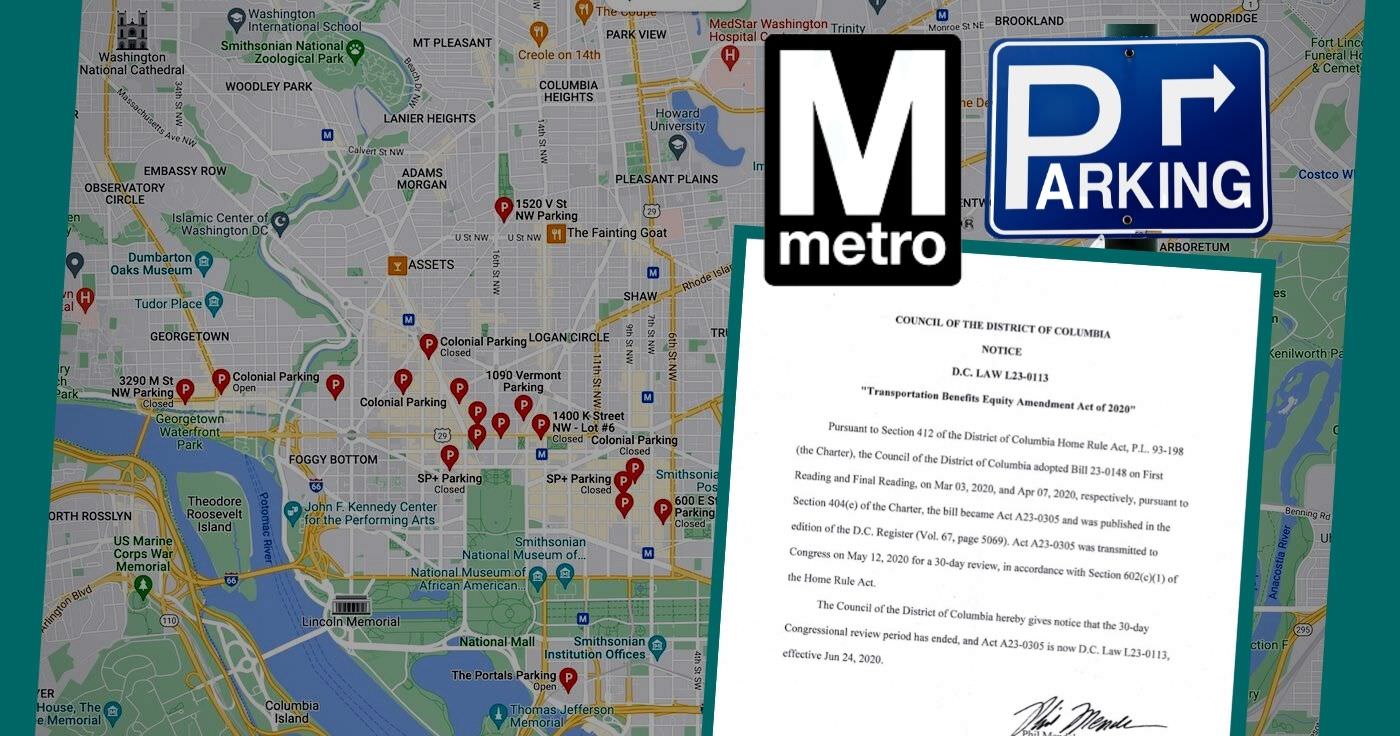Since the enactment in 2020 of the District of Columbia’s Transportation Benefits Equity Amendment Act (D.C. ACT 23-305), otherwise known as the Parking Cashout Law, the District Department of Transportation (DDOT) developed regulations to implement the law. Beginning January 15, 2023, employers in the District are required to submit annual or biennial reports to the City by mid-January. The new law requires employers who provide parking benefits to also offer ‘clean air’ transportation benefits to their employees. Here is what you need to know about D.C.’s new parking cashout law.
Who Does the Law Apply To?
The law applies to employers with 20 or more employees located in Washington, DC who offer parking benefits to any employees. Parking benefits include employer-paid or subsidized parking (such that the employee pays less than the market rate parking cost) for an employee’s personal vehicle on site or within ½ mile of the site.
Exemptions:
- Parking offered to an employee who is required to use a personal vehicle in the regular performance of their work is not considered a parking benefit.
- Covered employers who owned the parking spaces used by employees prior to October 1, 2020, and who continue to own those parking spaces are exempt.
- Covered employers who leased the parking spaces used by employees prior to October 1, 2020, are exempt until the end of the current lease term.
- Covered employers who were subject to a TDM plan (reviewed by DDOT) prior to October 1, 2020, are exempt until the end of the current term of the TDM plan or after five years, whichever is earlier.
- Covered employers who were subject to a Campus Plan prior to October 1, 2020, are exempt until the end of the current term of the Campus Plan, if the Campus Plan requires annual reporting of the current percentage and year-over-year change in trips made by car, performance standards related to the reduction in auto trips, and policies the employer will adopt to meet the performance standards.
What Does the Parking Cashout Law Require?
The law requires employers who offer a parking benefit to also do one of the following:
- Offer a Clean Air Transportation Fringe Benefit, for modes of transportation such as Metro, bus, vanpool, or bicycling.
- Pay a Clean Air Compliance fee of $100 per month for each employee offered a parking benefit.
- Successfully implement a transportation demand management (TDM) plan, subject to DDOT approval, that would reduce the number of commuter car trips made by employees by at least 10% from the previous year until no more than 25% of employees’ commuter trips are made by car. The TDM plan must include an annual reporting requirement that provides data to demonstrate compliance with the required trip reductions. Non-compliance requires the employer to begin offering a Clean-air Transportation Fringe Benefit or to begin paying a Clean Air Compliance fee, after a 180-day adjustment period to try to bring the TDM plan into compliance.
An employee cannot accept the Clean Air Transportation Fringe Benefit unless they forfeit the parking benefit offered by the employer.
If the amount of Clean Air Transportation Fringe Benefit used by the employee is less than the amount of the Clean Air Transportation Fringe Benefit offered by the employer (as required under the law), the employer shall provide the employee additional compensation and/or an increase in contribution to the employee’s health coverage to make up for the difference.
How to Report
Each covered employer, even those who are exempt, is required to submit a report by January 15 and every two years thereafter that includes the following information:
- The total number of employees,
- The number of employees:
- Offered a parking benefit,
- Using a parking benefit,
- Offered a Clean-air Transportation Fringe Benefit, and
- Using a Clean-air Transportation Fringe Benefit
The District offers a reporting portal open to covered employers. Covered employers electing to implement a TDM Plan must also submit a commuter survey report starting on January 15 and every year thereafter.
Exempt employers must demonstrate that they are exempt by providing the following information, as applicable:
- If the employer owns their parking, the date on which any owned parking was purchased (the date must be prior to October 1, 2020, to qualify for the exemption),
- If the employer is under a lease agreement for parking that began before October 1, 2020, the expiration of the current lease term,
- If the employer is subject to a TDM plan that was approved by DDOT before October 1, 2020, the date on which the TDM plan will expire.
- If the employer is subject to a Campus Plan that was approved prior to October 1, 2020, the date on which the current Campus Plan expires.
- If the employer does not provide a parking benefit, documentation demonstrating that free, subsidized, or reimbursed parking is not provided to employees.
Development Review
Section 5.3.2 of the District’s 2022 Comprehensive Transportation Review (CTR) guidelines note that while the Parking Cashout Law is not enforced as a part of the zoning process, each non-residential TDM Plan is expected to include a requirement that the development’s future Transportation Coordinators provide proof to DDOT and goDCgo that the law is being fulfilled. As an element of the District’s overall Commuter Benefits law, enforcement is by the Department of Employment Services (DOES).
Further information on the DC Parking Cashout law can be found via DDOT’s Parking Cashout Toolkit for Employers or by contacting Wells + Associates.

